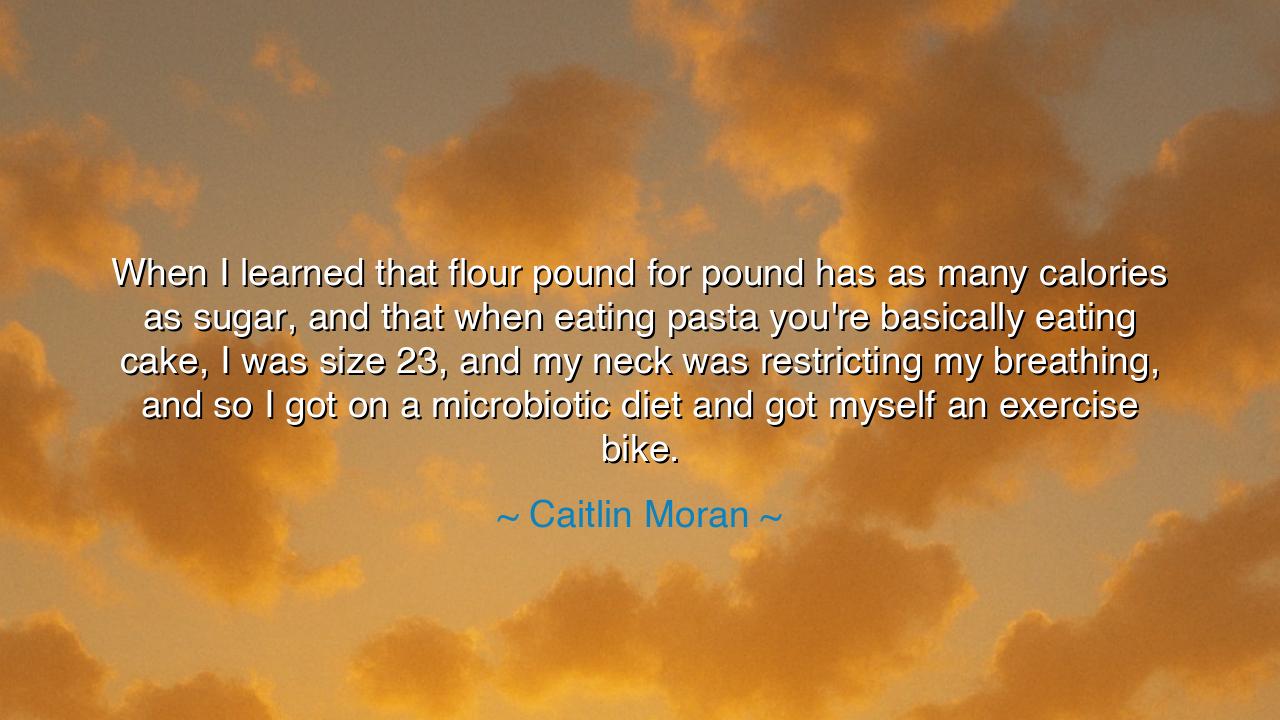
When I learned that flour pound for pound has as many calories as
When I learned that flour pound for pound has as many calories as sugar, and that when eating pasta you're basically eating cake, I was size 23, and my neck was restricting my breathing, and so I got on a microbiotic diet and got myself an exercise bike.






In the words of Caitlin Moran, “When I learned that flour pound for pound has as many calories as sugar, and that when eating pasta you're basically eating cake, I was size 23, and my neck was restricting my breathing, and so I got on a macrobiotic diet and got myself an exercise bike,” there is not only confession but revelation—a cry of awakening from the quiet bondage of indulgence. Hers is not the tale of vanity, but of rebirth through awareness, of realizing how ignorance binds the body as surely as chains bind the captive. In this statement lies a truth the ancients long understood: that knowledge is the first step toward transformation, and that to master one’s life, one must first master the vessel that carries it.
To say, “I learned that flour pound for pound has as many calories as sugar,” is to speak of the moment when illusion gives way to truth. For flour, that humble substance of daily bread, has long been a symbol of sustenance and comfort. Yet Moran, in her discovery, uncovers its shadow—the hidden sweetness of excess that dulls the senses and slows the spirit. So too did the philosophers of old warn that even blessings, when consumed without mindfulness, become poisons. The sage Hippocrates declared that gluttony was not nourishment but decay, and that to eat without understanding was to trade health for pleasure. Moran’s realization mirrors that ancient wisdom: that ignorance of what enters the body is ignorance of what shapes the soul.
Her image of “eating pasta is basically eating cake” strikes with both humor and tragedy, for it exposes the comfortable deceit by which modern people live. What appears innocent, even wholesome, can be the very thing that weakens us. The ancients would have called this the delusion of the senses—the way sweetness hides in disguise, the way desire cloaks itself in moderation. In every age, mankind has struggled against temptation that wears the face of innocence. For Moran, the revelation was not merely about food—it was about truth unmasked, about seeing through the illusions that keep us content but not whole.
When she speaks of being “size 23, and my neck was restricting my breathing,” her words bear the weight of both suffering and awakening. This is the moment in the hero’s journey when one stands before the mirror and sees the cost of neglect. The ancients told of Odysseus, who wandered not only through seas but through his own weaknesses—tempted by ease, tested by indulgence, and finally forced to reclaim his strength. Moran’s struggle is of the same essence: the journey from comfort to confrontation, from passivity to discipline. The body that once betrayed her becomes, through effort, her ally. It is not punishment that drives her, but the will to live—to breathe freely, to rise again in her own power.
The path she chose—a macrobiotic diet and an exercise bike—was more than a regimen; it was an act of reclamation. To the ancients, this would have been the way of balance, the pursuit of harmony between consumption and action. The macrobiotic philosophy itself, rooted in the wisdom of Eastern thought, teaches that health arises from alignment with nature’s rhythm, that the body is nourished best when its food is pure, its habits deliberate, and its spirit calm. In taking up this way, Moran became as the monks of old who renounced excess to regain clarity. Her exercise bike was her discipline, her diet her meditation—a daily return to self-mastery through persistence and restraint.
Yet her words also carry compassion. There is no cruelty in her tone, no scorn for her past self. She does not speak as one who conquered, but as one who learned. The lesson she offers is not one of vanity, but of vigilance and kindness: to care for oneself not out of self-loathing, but out of love for the life one has been given. The ancients, too, held this belief—that the body is the temple of the spirit, and that neglecting it is a form of ingratitude to the divine. Moran’s story, then, becomes not a tale of dieting, but of devotion—to health, to consciousness, to life itself.
Let this teaching be carried forward: change begins with truth, and truth begins with awareness. Look not with disdain upon the habits that have held you back, but with the courage to understand them. Learn what sustains and what destroys, and choose the path of balance, not excess. Eat with gratitude, move with purpose, and let discipline be your freedom, not your burden. For as Moran discovered, to awaken is to reclaim the strength that was always yours—to breathe without struggle, to live without regret, and to rise from the comfort that once held you captive.
Thus, the wisdom of Caitlin Moran stands as both warning and light: that the body reflects the choices of the spirit, and that liberation begins not in denial, but in awareness. She teaches that the smallest act of change—a wiser meal, a turn of the pedals—can become the first movement in a symphony of renewal. For those who seek transformation, her words echo like an ancient call: awaken from ignorance, honor your body, and through the union of knowledge and action, find again the strength to live fully.






AAdministratorAdministrator
Welcome, honored guests. Please leave a comment, we will respond soon